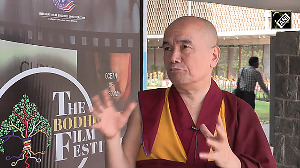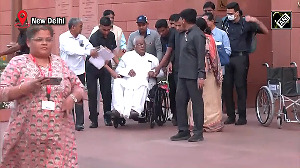In the first part of the interview, Major General (retired) Afsir Karim, an expert on internal disturbances, conflicts and insurgencies in and around India, spoke of the secular credentials of the Indian Army.
Part I: 'There are no communal feelings in the army'
In the second and final part, he speaks to rediff.com's Sheela Bhatt of the worrying internal security situation that India faces.
You retired long back. Recently Congress party spokesman Abhishek Manu Singhvi has mentioned that during the Bharatiya Janata Party rule they had tried to saffronise the army.
I can't comment on BJP rule but I know that some years ago there was a circular in the army that certain radical elements -- both Communist and from the RSS -- wanted to infiltrate the army. They were not allowed to do that. Actually regimentation of the army is stronger than outside influence. But, an odd individual whose mental makeup or background is such can always be like Lt Col Srikanth Purohit. After all, there have been spies in the army who got their comrades killed. That does not mean all of us are spies.
What is most disturbing about the entire event?
As is said, I have a sense of disappointment that this could happen in our army which has never happened before. The army does have enough measures to stop it. After all, Purohit must be clever if he could hide himself for so long. We don't follow everybody but there is watch on people dong sensitive jobs or doing things which are not normal.
A Pakistani army officer had once told rediff.com that Pakistani soldiers consider India as the enemy country and that makes the peace process difficult. Do you think this current War on Terror is also influencing Indians?
No, in the Indian Army we don't call the enemy by name. The enemy is merely an enemy. Even in our writing, in our operational order we don't call Pakistan or China or any other country by name. Yes, we may have feelings against Pakistan because we have fought a war, but to a limited extent. When war is not on we are not anti-Pakistan. On the LoC we have no enmity as such with Pakistanis in normal times. It's not like politics, we fight back only if they fire or in case of war. It's a question of what they are doing and what we are supposed to do in case of war. We are always prepared for it but we are not anti-Pakistan.
Initially, after Partition, there was this anti-Pakistan feeling among people who were thrown out of that land but that feeling has disappeared. So, I don't see any other external influence on Indian army men. Even our war cries are by caste, although there are Hindi or Hindu names, but it is regiment specific. In my regiment, there were four communities so we had four war cries. It's for personal use, during war when you are going to die you take hope from God. It has nothing to do with just Hindu or Sikh religion. It's for personal strength.
How do you prevent incidents like this where army men get involved?
Yes, it's extremely important to prevent such incidents in future. There should be strict vigilance in the army. In the last 10 years a lot of communal divide has taken place and we have to win away these people who are affected by communal thinking.
It's not difficult in the army. The regimentation is quite good if it's properly enforced. If your senior officers are weak, only then is the army in trouble. It is the CO's moral authority and discipline that counts. The senior officer has to be secular to enforce the same sentiments in his junior officers. By and large, Indian jawans are extremely secular.
I have seen Hindu COs attending mosques on Fridays. During the war against Pakistan in 1971, I was in Jammu and my jawans could have felt something about me. But no, my jawans knew 'he belongs to us'. That was the level of our regimentation. In the regiment everybody belonged to each other and all of us belonged to India.
But, society is changing. There will be an effect on the army. We should take greater care. There is no need for alarm. In the army you are not made to feel like a Hindu or a Muslim but the army man of the regiment you belong to. I have never felt as a Muslim in the army. I belonged to my regiment being an Indian. I think if the senior officers are proper, nothing will happen to the Indian Army.
How do you see the ATS's charges of terrorism on a Hindu group, from the strategic point of view?
This is retaliatory terrorism. India is facing terrorism from Pakistan and Al Qaeda which is strategic. There is domestic terrorism by separatists. These guys are not interested in Pakistan. They have their own agenda. Then, there is retaliatory terrorism which has started after the Babri Masjid demolition and the Mumbai riots. Before that there were no Muslim terrorists outside Kashmir. Once again, in retaliation a Hindu group has come up. There were radicals and reactionaries who will talk against Muslims but will not do physical damage except that they instigated communal riots. But they were not into terrorism. Malegaon is a new phenomenon. This is what I call retaliatory terrorism, which was also seen in 1984 when a Sikh killed Indira Gandhi.
This kind of retaliatory terrorism can be settled from within provided the political environment is settled and political parties don't fight each other about who is doing what on the issue of terrorism. Please control this retaliatory terrorism, because this will destroy the country's ethos and curb the country's progress. No enemy is needed to come here to do that.
Where is the entire situation leading to?
We are now witnessing the worst possible internal security situation. It has spread all over. The Naxalites in the north-east, Kashmir is disturbed, Uttar Pradesh is unsafe, Maharashtra is mired in violence. Violence, whether widespread or not, affects a large number of people. I don't think we are doing much about it. Political parties are blaming each other but not stopping it. We are now in a dangerous position internally. I think the radical side is aggressive. Political parties, the media and civil society should understand that this kind of violence will destroy our country. Somebody has to put together all that is divided. To do that we require leadership at the top, which I don't think is present today.
The poor in the Muslim community are above communalism. It's the middle class which is watching TV, goes on the internet, goes to the Middle East and knows what happened in Gujarat. Similarly the poor common Hindus are extremely tolerant. But select groups of Hindus got indoctrinated through communal parties and associations and are turning into radicals. The percentage of radical Muslims will be larger than Hindus compared to their population. But, they have turned into radicals after the Mumbai riots.
But both radicals groups can be won. It's not only radicals but we should win away the people who are sitting on the fence thinking that he/she has no future in India. This spread of hatred and fear should be stopped. We should win them over. Political and social leadership should set this right. They must organise themselves and fight this menace if they really love this country.
How will this affect India's internal security environment?
Firstly, the Malegaon investigation has given satisfaction to people that the police have done a good job. They are not communal and they are not after one community. The pressure on Muslims has reduced. Overall, the effect will be much better than what it is today provided political parties and radical groups play the game correctly. They could create a further mess. If both Hindus and Muslims feel the police are doing their job sincerely without any bias, then it will do good for the internal security of country.
But if this thing goes on, it will be the worst possible thing for India. Because, internally, you will have so many problems. The Muslim population is very big and not a minority. Even if some small percentage gets engaged in terrorism and against them if some radical Hindu groups comes out, there will be civil war in India. It will be much worse because they will be using all kinds of weapons and explosives. This must stop immediately. Otherwise the country's security and integrity will be affected.






 © 2025
© 2025